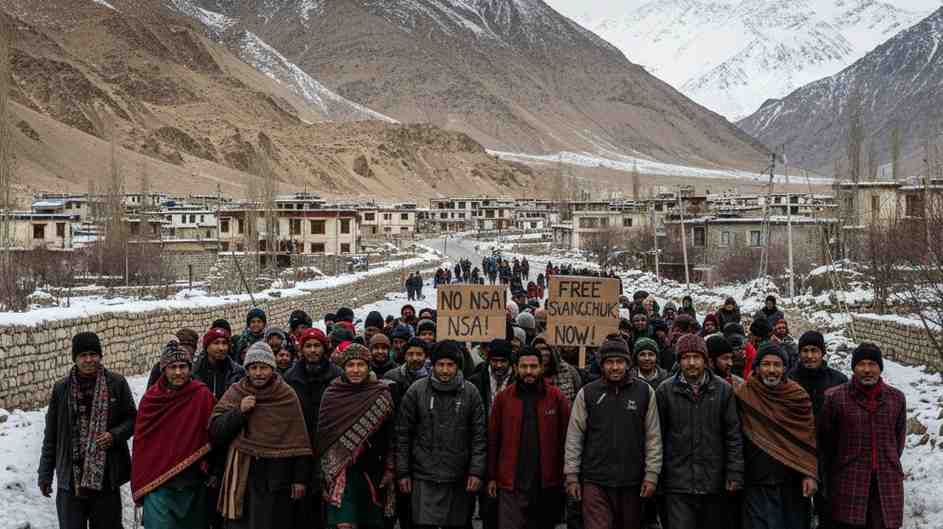Sonam Wangchuk Arrest 2025: Ladakh Protests, NSA Detention, FCRA Cancellation & Political Fallout
Learn everything about Sonam Wangchuk’s arrest during the Ladakh protests 2025. Full details on NSA detention, FCRA licence cancellation, Pakistan link allegations, wife’s response, political reactions, and statehood movement for Ladakh.
Introduction
Sonam Wangchuk, an engineer, innovator, environmental activist, and Ramon Magsaysay awardee, has been at the forefront of the Ladakh movement for statehood and Sixth Schedule safeguards. In September 2025, Ladakh witnessed one of its most violent protests, resulting in four deaths and numerous injuries. Shortly after, Wangchuk was arrested under the National Security Act (NSA), sparking nationwide debate on dissent, governance, and rights in Ladakh.
This article explains the events, allegations, legal angles, and political consequences in detail.
Timeline of Events
Background: Ladakh’s Demands
- Since becoming a Union Territory in 2019 (after the abrogation of Article 370 in Jammu & Kashmir), Ladakh has been governed directly by the Centre.
- Locals demand:
- Full Statehood
- Sixth Schedule Protection (tribal autonomy in governance, land, and resources).
- Sonam Wangchuk became the face of the movement, organizing hunger strikes, awareness campaigns, and protests.
September 2025 Protests & Violence
- On 25–26 September 2025, protests in Leh turned violent.
- Clashes between protesters and security forces left four dead and several injured.
- Authorities accused Wangchuk of delivering provocative speeches that triggered unrest.
Arrest Under the National Security Act
- Wangchuk was arrested on 26 September 2025 under the NSA.
- NSA allows preventive detention without bail for up to a year in specific cases.
- Police claimed he attempted to “sabotage” talks on Ladakh’s status and incited the violence.
FCRA Licence Cancellation & CBI Probe
- Wangchuk’s NGO, SECMOL (Students’ Educational and Cultural Movement of Ladakh), lost its FCRA licence (Foreign Contribution Regulation Act) due to alleged violations.
- The CBI opened an investigation into financial irregularities linked to SECMOL and the Himalayan Institute of Alternatives, Ladakh (HIAL).
Allegations of “Pakistan Links”
- Ladakh DGP alleged that Wangchuk had contact with Pakistani intelligence operatives and had travelled to Pakistan and Bangladesh.
- His wife, Gitanjali Angmo, dismissed the claims, calling them a politically motivated smear campaign.
- She pointed out that his visits were for climate change conferences, not political activity.
Wife’s Counterclaims
- Gitanjali Angmo said:
- She had not received any formal detention order.
- The government’s “witch hunt” began four years ago, when Wangchuk intensified his activism.
- She questioned: “If India can play cricket with Pakistan, why can’t an activist attend a climate event there?”
Political Fallout & Protests
- Congress and several opposition parties called his arrest “draconian”.
- Farmers’ groups like Samyukta Kisan Morcha (SKM) demanded his release.
- Protests in Uttarakhand and other states showed growing public solidarity.
- Critics accused the government of suppressing democratic dissent.
Legal & Constitutional Aspects
- National Security Act (NSA)
- Preventive detention law.
- Critics argue that its use against a nonviolent activist is excessive.
- Supporters say the violent outcome justified action.
- FCRA Cancellation
- Without an FCRA licence, NGOs cannot receive foreign donations.
- The move has crippled SECMOL’s funding.
- Critics call it targeted harassment; the government cites financial violations.
- Freedom of Speech & Protest
- Article 19 of the Constitution guarantees freedom of speech and peaceful assembly.
- Debate: Were Wangchuk’s speeches legitimate dissent or incitement to violence?
- Sixth Schedule Demand
- It would establish a tribal autonomous council in Ladakh, similar to those in Meghalaya, Mizoram, Tripura, and Assam.
- The central government has been reluctant, citing the strategic importance of Ladakh (border with China & Pakistan).
Wider Implications
- Civil Society & NGOs: Revoking FCRA licences is becoming a tool to restrict NGOs critical of the government.
- Geopolitical Angle: Allegations of Pakistan links raise the stakes, given Ladakh’s sensitive border position.
- Democracy vs Security: The case epitomizes the tension between national security and democratic freedoms.
- Future of Ladakh: The outcome could shape Ladakh’s governance model—whether as a Union Territory, a State, or under Sixth Schedule autonomy.
FAQs on Sonam Wangchuk’s Arrest 2025
Who is Sonam Wangchuk?
Sonam Wangchuk is an engineer, innovator, and activist from Ladakh, known for sustainable development projects like ice stupas and solar schools. He was awarded the Ramon Magsaysay Award in 2018.
Why was Sonam Wangchuk arrested?
He was arrested after violent protests in Leh on 26 September 2025. Authorities allege his speeches incited violence and endangered peace.
What is the NSA, and why is it controversial?
The National Security Act (1980) allows preventive detention for up to 12 months. It is controversial because it is often used against political activists and bypasses normal bail protections.
What is FCRA, and why was his NGO’s licence cancelled?
The Foreign Contribution Regulation Act (FCRA) regulates foreign donations to NGOs. Wangchuk’s NGO SECMOL lost its licence due to alleged violations, though his supporters claim it was politically motivated.
What are the demands of the Ladakh movement?
The main demands are:
Statehood for Ladakh
The Sixth Schedule protects tribal identity, land rights, and culture.
What’s next for Wangchuk?
His detention under the NSA may be challenged in court. Civil society groups and opposition parties are mobilizing protests demanding his release.
Conclusion
The arrest of Sonam Wangchuk marks a turning point in Ladakh’s struggle for identity and autonomy. While the government cites national security and law & order, his supporters call it an attack on democratic rights and activism. The legal, political, and constitutional questions raised by this case are likely to shape India’s discourse on civil liberties and governance in frontier regions for years to come.

























